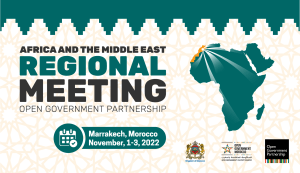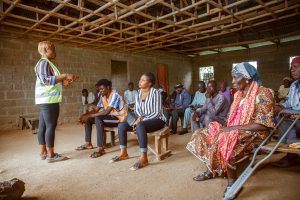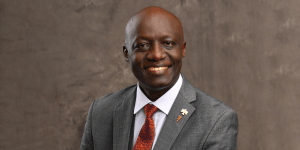Faces of Open Government: Philip Thigo
Rostros del gobierno abierto: Philip Thigo
Reformers in government are essential to ensure open government is mainstreamed in public policy so institutions can respond to citizens’ needs. Philip Thigo has been the OGP point of contact in the Government of Kenya for many years, working with civil society partners to advance the open government agenda in the country. As Philip continues to explore and interrogate frontier issues in the open government space, he reflects on upcoming events, open gov trends and his hopes for the future.
The Government of the Kingdom of Morocco just announced the OGP regional meeting, focusing on delivering public services through open government approaches, including anti-corruption efforts. How can governments work with citizens to improve how we deliver services like, for instance, health and educationAccountability within the public education system is key to improving outcomes and attainment, and accountability is nearly impossible without transparent policies and opportunities for participation ...?
We would like to laud the leadership of Morocco in offering to convene a regional open government meeting, focusing on how values of openness improve service delivery. There is a great potential, more than ever, to increase citizen engagement and participation on how governments can best respond to the needs and priorities of citizens. Governments also require, as part of this responsiveness, critical feedback on the quality and effectiveness of services. The business of governing is no longer a prerogative of governments alone. It requires the participation of all sectors of society.
This requires near real-time engagement, even at times, deployment of predictive analytics to anticipate the needs of citizens amidst an era of multiple crises. Through strategic harnessing of technologies, in an ethical and inclusive manner, governments can transform how they engage citizens and provide multiple channels for feedback and participation.
Governments can also ensure inclusionOGP participating governments are working to create governments that truly serve all people. Commitments in this area may address persons with disabilities, women and girls, lesbian, gay, bisexual, tr... More, especially in health and education services, by involving communities in managing these resources, increasing awareness of the rights of citizens on duty bearers (through service charters) and exploring mechanisms for incentives, rewards and sanctions.
Ultimately, governments will be required to create a mechanism, in law and policy, that ensures inclusive, accountable, and measurable public engagement and participation in matters that affect their lives. In an era of diminished trust, governments need a culture change and mind shift of how they perceive citizens and re-imagine how they engage citizens based on dialogue and mutual respect.
Digital governanceAs evolving technologies present new opportunities for governments and citizens to advance openness and accountability, OGP participating governments are working to create policies that deal with the ... More has been an increasingly popular theme in OGP, mostly in countries like France, the Netherlands and the U.K.. Why do you think that is and could countries like Kenya join the fray in the near future?
Countries such as the U.K., France, and the Netherlands, due to their infrastructure and industry, have been quick to embrace digital governance. Technology adoption must be based on context. Kenya has been at the forefront of embracing how technology can be harnessed to improve service delivery. Over time, the country has developed a technology blueprint, commissioned a task-force on emerging technologies, and institutionalized eGovernance, including digitizing critical services. In our current OGP action planAction plans are at the core of a government’s participation in OGP. They are the product of a co-creation process in which government and civil society jointly develop commitments to open governmen..., we’ve included commitments that speak to digital governance, such as open dataBy opening up data and making it sharable and reusable, governments can enable informed debate, better decision making, and the development of innovative new services. Technical specifications: Polici... for development, public participationGiving citizens opportunities to provide input into government decision-making leads to more effective governance, improved public service delivery, and more equitable outcomes. Technical specificatio... and legislative openness, improving public service deliveryTo ensure that citizens of all groups are better supported by the government, OGP participating governments are working to improve the quality of and access to public services. Commitments in this are... More performance and access to information. While these commitments are not explicitly anchored under digital governance, they speak to Kenya’s ambitionAccording to OGP’s Articles of Governance, OGP commitments should “stretch government practice beyond its current baseline with respect to key areas of open government.” Ambition captures the po... to build a digital governance architecture based on a solid foundation.
Kenya recognizes that in the era of technological acceleration, it is not about digital governance alone, but governance in the era of a digital age. Our view is focused on how governance can be responsive across the breath of society in an era of technological acceleration. How can we govern leveraging digital technologies, and conversely, how can we govern the technologies themselves, so that their impacts do not create a more unequal society.
Kenya has been an active member of OGP and even joined its Steering CommitteeThe Steering Committee is OGP’s executive decision-making body. Its role is to develop, promote and safeguard OGP’s values, principles and interests; establish OGP’s core ideas, policies, and ru... a few years ago. As OGP enters its second decade, what do you want to see from the open gov community in the next ten years?
The Open Government PartnershipThe Open Government Partnership (OGP) is a multi-stakeholder initiative focused on improving government transparency, ensuring opportunities for citizen participation in public matters, and strengthen... More, in our view, remains the best platform for dialogue between multiple actors based on clear principles that focus on the improvement of service delivery for citizens. While new challenges emerge, the fundamentals are the same.
OGP, its infrastructure such as the multi-stakeholder forums, engagement of local governments, the Steering Committee that is co-convened by civil society and government, and the action plans that seek to accelerate delivery and impact for citizens are required if we are to re-imagine democracy.
The open government community is necessary in an age of loss of trust and uncertainty. Trust can only be gained by working together, implementing incremental reforms, and building on the pillars of an open, transparent and accountable governance architecture based on co-creation. I definitely see OGP as perhaps the best tested, trusted, and agile mechanism to future-proof democracy.
Para asegurar que el gobierno abierto se incorpore de manera transversal en la política pública y que las instituciones puedan responder a las necesidades de la ciudadanía, es fundamental contar con personas reformadoras en el gobierno. Philip Thigo ha sido punto de contacto de gobierno de Kenia desde hace muchos años y ha trabajado en coordinación con la sociedad civil para impulsar la agenda de gobierno abierto del país. Philip continúa explorando temas de frontera en el espacio de gobierno abierto y, en ese contexto, reflexiona sobre los eventos próximos, las tendencias del gobierno abierto y sus expectativas para el futuro.
El Gobierno del Reino de Marruecos acaba de anunciar la reunión regional de OGP, que se enfocará en asegurar la provisión de servicios públicos con una perspectiva de gobierno abierto, incluyendo esfuerzos anticorrupción. ¿Cómo crees que los gobiernos pueden trabajar con la ciudadanía para mejorar la provisión de servicios públicos como la salud y la educación?
Queremos reconocer el liderazgo que demostró Marruecos al ofrecerse a ser la sede de una reunión regional de gobierno abierto, enfocándose en los valores de la apertura y su potencial para mejorar la provisión de servicios. Hoy, más que nunca, hay un gran potencial de fortalecer la participación ciudadana para asegurar que los gobiernos respondan a las necesidades y prioridades de la ciudadanía. Como parte de esta capacidad de respuesta, los gobiernos también necesitan tener acceso a retroalimentación sobre la calidad y efectividad de los servicios. El acto de gobernar ya no es sólo una prerrogativa del gobierno, pues exige la participación de todos los sectores de la sociedad.
Esto implica una colaboración casi en tiempo real e incluso, en ocasiones, el despliegue de análisis predictivos para anticiparse a las necesidades de la ciudadanía, en particular en el contexto de las diversas crisis que estamos viviendo. A través de un aprovechamiento estratégico, ético e incluyente de la tecnología, los gobiernos pueden transformar la forma en la que se comunican con la ciudadanía y ofrecer diversos canales de retroalimentación y participación.
Los gobiernos también pueden asegurar la inclusión, en particular en los servicios de salud y educación, involucrando a las comunidades en el manejo de los recursos, sensibilizando sobre los derechos de la ciudadanía y explorando mecanismos de incentivos, recompensas y sanciones.
Los gobiernos deberán crear un mecanismo legal y de política que asegure la participación de la ciudadanía en los temas que le afectan de forma incluyente, responsable y medible. En la era del debilitamiento de la confianza, los gobiernos requieren de un cambio de cultura y mentalidad sobre cómo perciben a la ciudadanía y reimaginar cómo colaboran con ella con base en un diálogo y respeto mutuo.
La gobernanza digital es un tema cada vez más popular en OGP, sobre todo en países como Francia, los Países Bajos y el Reino Unido. ¿Por qué crees que esto está ocurriendo? ¿Crees que países como Kenia seguirán esta tendencia en el corto plazo?
Debido a su infraestructura e industria, algunos países como el Reino Unido, Francia y los Países Bajos han podido adoptar la gobernanza digital de forma rápida. La adopción de la tecnología debe reflejar los diferentes contextos. Kenia ha estado a la vanguardia en el uso de la tecnología para mejorar la provisión de servicios públicos. Con el tiempo, el país ha desarrollado un plan, establecido un grupo de trabajo sobre tecnologías emergentes e institucionalizado la gobernanza electrónica, incluyendo la digitalización de servicios clave. En nuestro actual plan de acción de OGP, incluimos compromisos sobre gobernanza digital, por ejemplo datos abiertos para el desarrollo, participación pública y apertura legislativa, mejora del desempeño de la provisión de servicios públicos y acceso a la información. Estos compromisos no están anclados específicamente en la tecnología digital, pero son un ejemplo de las intenciones de Kenia de crear una arquitectura de gobernanza digital con base en una fundación sólida.
Kenia reconoce que, en la era de la aceleración tecnológica, la prioridad no es solo la gobernanza digital en sí misma, sino la gobernanza en la era digital. Nuestra perspectiva está enfocada en cómo la gobernanza puede ser receptiva a la sociedad en general en una era de aceleración tecnológica. ¿Cómo podemos gobernar aprovechando la tecnología digital? Y ¿Cómo podemos gobernar a las tecnologías en sí mismas, asegurando que sus impactos no exacerben la desigualdad de la sociedad?
Kenia ha sido miembro activo de OGP e incluso formó parte del Comité Directivo y OGP está empezando su segunda década. En ese sentido, ¿Qué esperas de la comunidad de gobierno abierto para los próximos diez años?
En nuestra opinión, la Alianza para el Gobierno Abierto sigue siendo la mejor plataforma de diálogo entre actores con base en principios claros enfocados en mejorar la provisión de servicios públicos para la ciudadanía. Aunque han surgido nuevos retos, el fundamento es el mismo.
OGP y su infraestructura, incluyendo a los foros multiactor, la vinculación con gobierno local, el Comité Directivo que está formado por la sociedad civil y el gobierno y los planes de acción que buscan acelerar los beneficios para la ciudadanía, son esenciales para la nueva democracia.
En la era de la pérdida de la confianza y la incertidumbre, la comunidad de gobierno es necesaria. Solo si trabajamos juntos, implementamos reformas graduales y fortalecemos los pilares de la gobernanza abierta, transparente y responsable basada en la cocreación fortaleceremos la confianza. Para mí, OGP es el mecanismo más probado, confiable y ágil que tenemos para blindar la democracia ante los retos del futuro.
Comments (1)
Leave a Reply
Related Content

Africa and the Middle East Regional Meeting
The 2022 OGP Africa and the Middle East Regional Meeting is taking place on November 1-3 in Marrakech, Morocco.

The Skeptic’s Guide to Open Government – 2022 Edition
Evidence continues to show that open government affects people’s lives. But there are still skeptics who are not aware of all the benefits associated with this approach. Use this guide…

Digital Governance in OGP
OGP countries are leveraging the opportunities of evolving technology, such as artificial intelligence, data-driven algorithms, and mass social networks, while also developing policies to deal with the threats, including disinformation,…


David Anot Reply
Maintaining ethical relationship in the incorporation of OGP and MBO will be essential in realisation of vision 2030. Technological acceleration should be in the best interest of the grassroot views. Proper awareness on the need and essence of the same wil see them embrace technological advancement thus making implementation of the drafted advancement a downhill task. This article is educative and I encourage you to publish similar ones to spread knowledge to the public.